
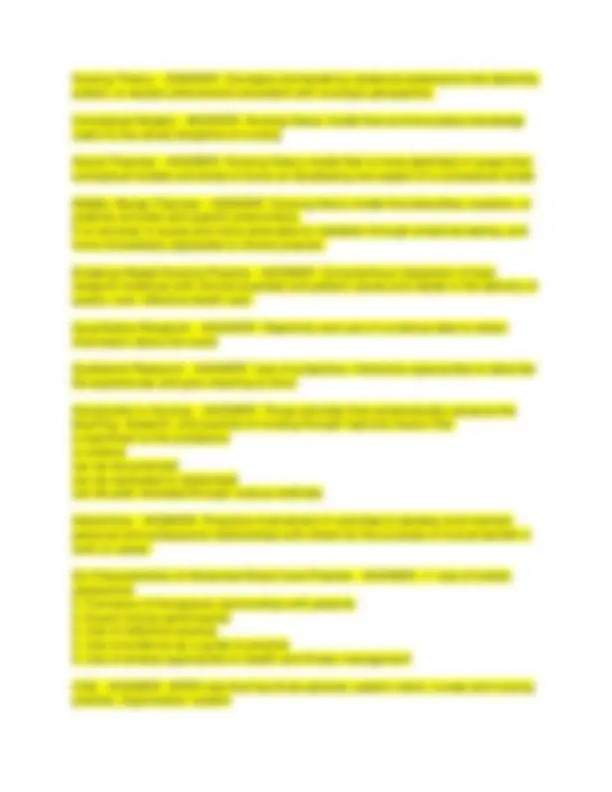
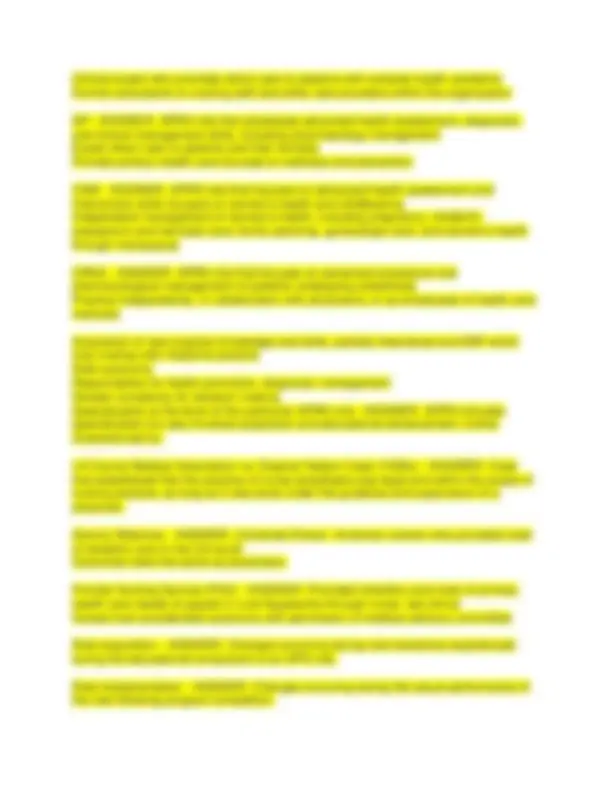
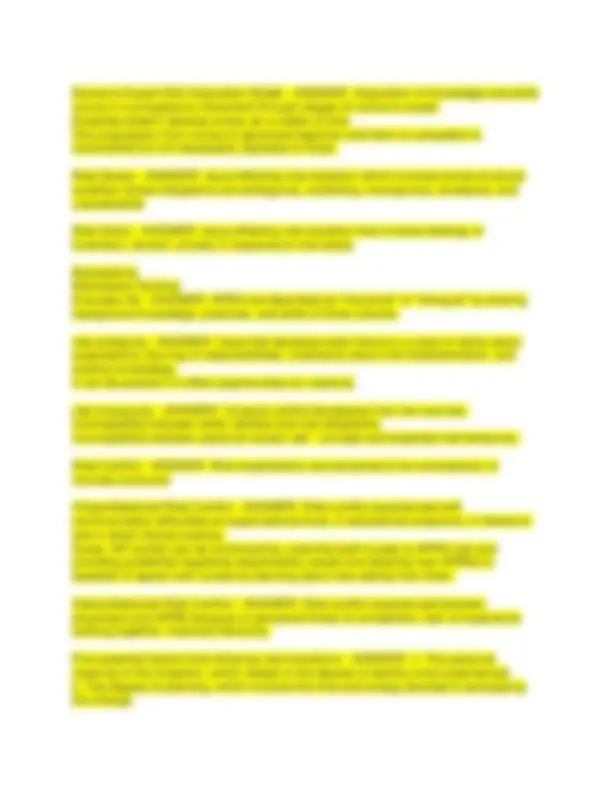
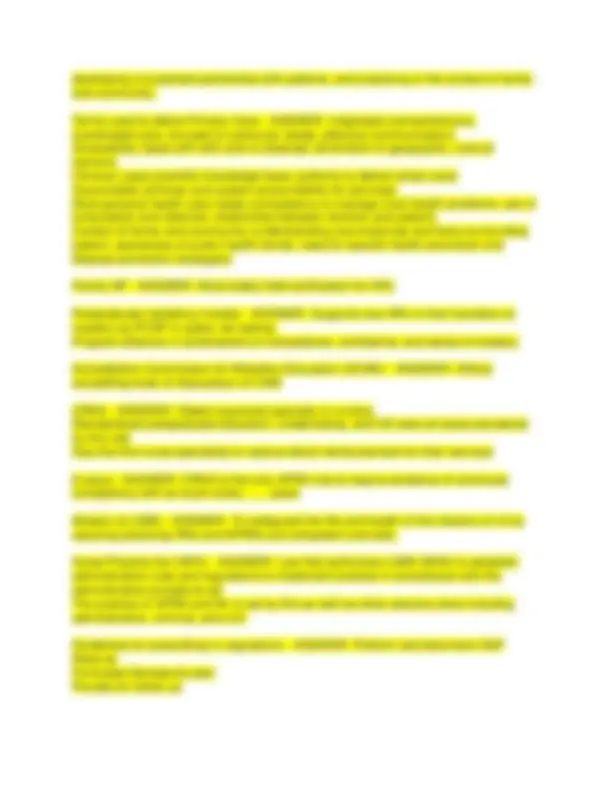
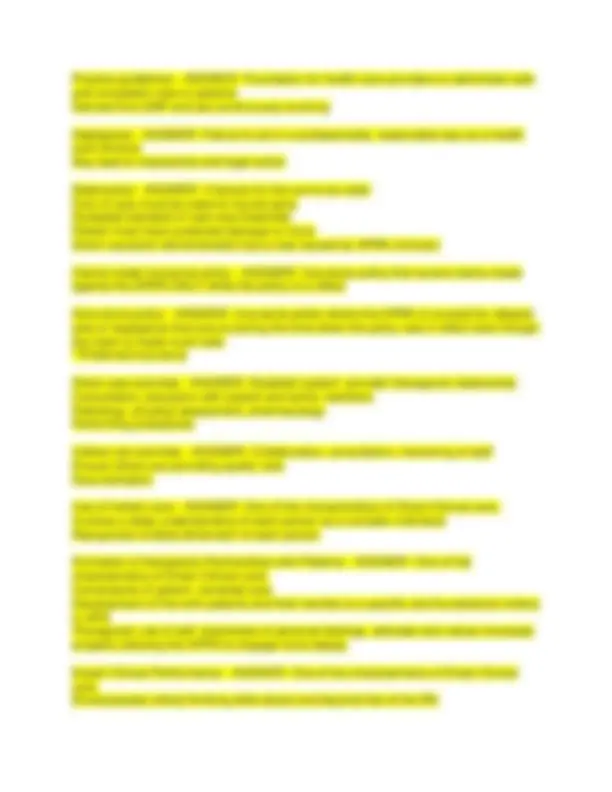
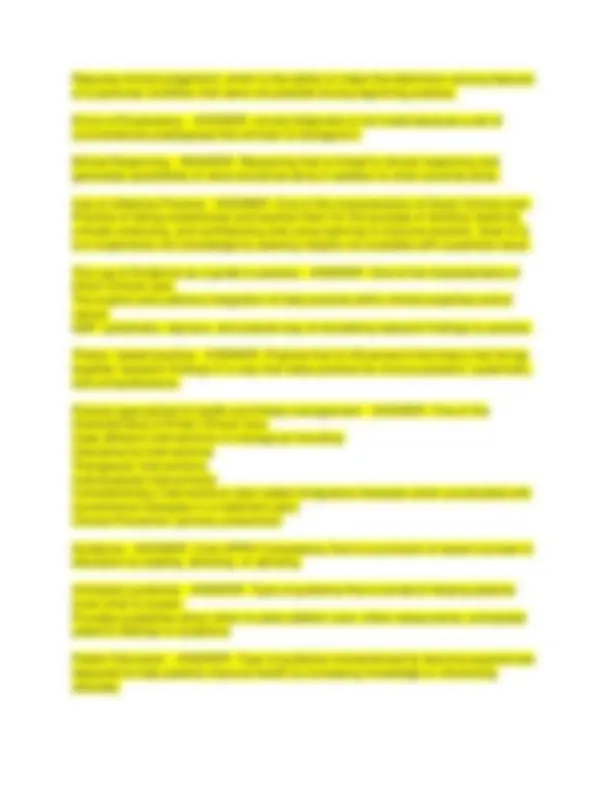
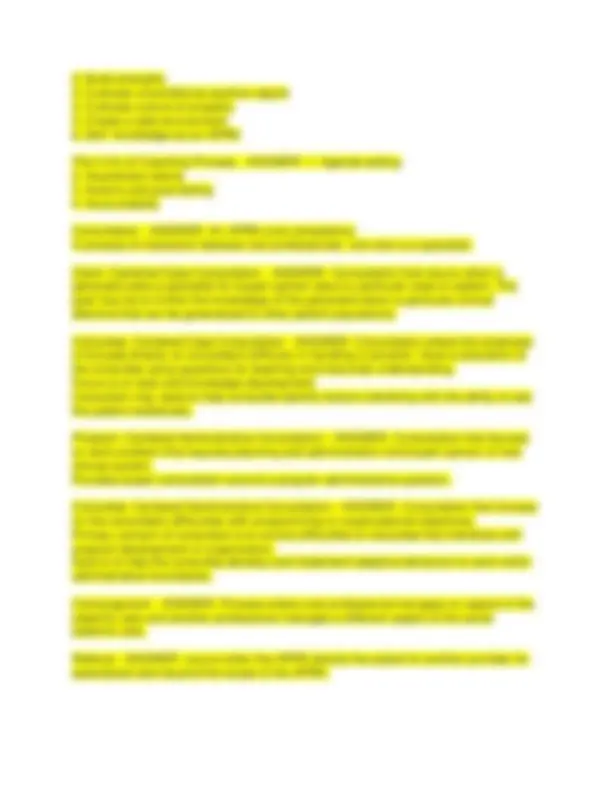
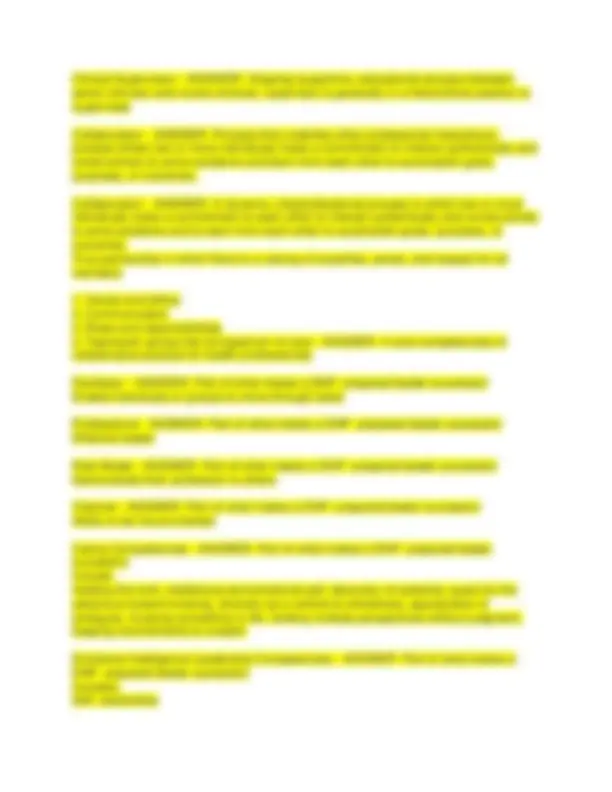
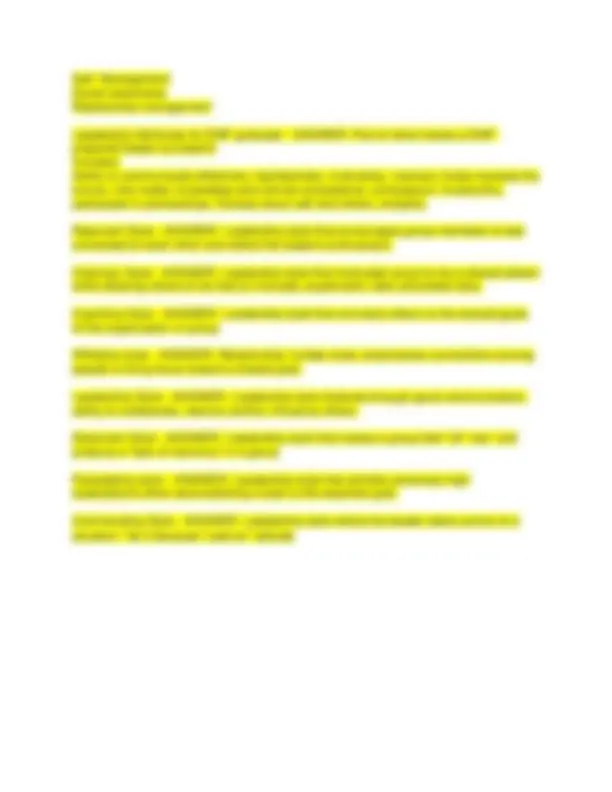


Study with the several resources on Docsity

Earn points by helping other students or get them with a premium plan


Prepare for your exams
Study with the several resources on Docsity

Earn points to download
Earn points by helping other students or get them with a premium plan
Community
Ask the community for help and clear up your study doubts
Discover the best universities in your country according to Docsity users
Free resources
Download our free guides on studying techniques, anxiety management strategies, and thesis advice from Docsity tutors
7105 Exam 1 questions With Answers..pdf
Typology: Exams
1 / 16

This page cannot be seen from the preview
Don't miss anything!










Advanced Practice Nursing (APN) - ANSWER- The performance of additional acts by RN who have gained added knowledge and skills through post- basic education and clinical experience. Describes the whole field of a specific type of advanced nursing practice Advanced Nursing Practice - ANSWER- Any form of nursing intervention that influences healthcare outcomes for individuals or populations, including the direct care of individuals and population, management of care for individuals and populations, administration of nursing and health care organizations, and the development and implementation of health policy. What one does in the various specialized roles (clinical practice, education, research, and leadership) APRN Criteria - ANSWER- 1) Graduate Education (masters OR doctorate)
Provides guidance for states to adopt uniformity in the regulation of APRN roles NCSBN - ANSWER- Independent, not-for-profit organization through which boards of nursing act and counsel together on matters of common interest and concern affecting public health, safety, and welfare Has 59 member boards Prescriptive Authority - ANSWER- Legal authority granted to advanced practice nurses to prescribe medication Collaborative Practice Agreement (CPA) - ANSWER- Formal agreement addressing the parameters between an APRN and a collaborating physician; approved by LSBN Controlled Substances - ANSWER- Additional privilege of an APRN not included with prescriptive authority; requires LCDS number + DEA Number Restrictions on Controlled Substances - ANSWER- APRNs may not prescribe controlled substances in connection with/treatment of: a) chronic pain b) obesity c) oneself, a spouse, child or any other family member 1970s - ANSWER- Doctorate degrees in nursing emerged AACN Essentials of Doctorate Education for ANP - ANSWER- I: Scientific Underpinning for Practice II: Organizational and systems leadership for quality improvement and systems thinking III: Clinical scholarship and analytical methods for EBP IV: Information- Systems- Technology and Patient care technology for the improvement of health care V: Healthcare policy for advocacy in health care VI: Interprofessional collaboration for improving patient and population health outcomes. VII: Clinical prevention and population health for improving the nation's health VIII: Advanced Nursing Practice. Focus of the DNP - ANSWER- Clinical Practice Leadership Health Policy and Advocacy Information Technology
Clinical expert who provides direct care to patients with complex health problems Formal consultants to nursing staff and other care providers within the organization NP - ANSWER- APRN role that possesses advanced health assessment, diagnostic, and clinical management skills, including pharmacology management Expert direct care to patients and their families Provide primary health care focused on wellness and prevention CNM - ANSWER- APRN role that focuses on advanced health assessment and intervention skills focused on women's health and childbearing Independent management of women's health, including pregnancy, childbirth, postpartum and neonatal care; family planning, gynecologic care, and women's health through menopause CRNA - ANSWER- APRN role that focuses on advanced procedural and pharmacological management of patients undergoing anesthesia Practice independently, in collaboration with physicians, or as employees of health care institutes Acquisition of new practice knowledge and skills, partially theoretical and EBP which may overlap with medicine practice Role autonomy Responsibility for health promotion, diagnosis/ management Greater complexity for decision making Specialization at the level of the particular APRN role - ANSWER- APRN includes specialization but also involves expansion and educational advancement, further characterized by: LA County Medical Association vs. Dagmar Nelson Case (1930s) - ANSWER- Case that established that the practice of nurse anesthesia was legal and within the scope of nursing practice, as long as it was done under the guidance and supervision of a physician. Granny Midwives - ANSWER- Untrained African- American women who provided most of obstetric care in the US south Outcomes were the same as physicians. Frontier Nursing Service (FNS) - ANSWER- Provided midwifery and most of primary health care needs of people in rural Appalachia through nurse- led clinics Nurses had considerable autonomy with permission of medical advisory committee Role acquisition - ANSWER- Changes occurring during role transitions experienced during the educational component of an APN role. Role Implementation - ANSWER- Changes occurring during the actual performance of the role following program completion.
Novice to Expert Skill Acquisition Model - ANSWER- Acquisition of knowledge and skills occurs in a progressive movement through stages of novice to expert Expertise doesn't develop simply as a matter of time The progression from novice to advanced beginner and them to competent is incremental but not necessarily stepwise or linear. Role Stress - ANSWER- Issue effecting role transition which involves social structural condition where obligations are ambiguous, conflicting, incongruous, excessive, and unpredictable Role Strain - ANSWER- Issue effecting role transition that involves feelings of frustration, tension, anxiety in response to role stress Biomedicine Mainstream Nursing Everyday life - ANSWER- APRN are described as "tricultural" or "trilingual" by sharing background knowledge, practices, and skills of three cultures: role ambiguity - ANSWER- Issue that develops when there is a a lack of clarity about expectations, blurring of responsibilities, uncertainty about role implementation, and existing knowledge. It can be positive if it offers opportunities for creativity role incongruity - ANSWER- Intrarole conflict developing from two sources. Incompatibility between skills/ abilities and role obligations Incompatibility between personal values/ self - concept and expected role behaviors. Role Conflict - ANSWER- Role expectations are perceived to be contradictory or mutually exclusive Intraprofessional Role Conflict - ANSWER- Role conflict experienced with communication difficulties at organizational level, in educational programs, in literature, and in direct clinical practice. Nurse- NP conflict can be minimized by: orienting staff nurses to APRN role and providing guidelines regarding responsibility issues and allowing new APRNs to establish a rapport with nurses by learning about new setting from them. Interprofessional Role Conflict - ANSWER- Role conflict experienced between physicians and APRN because of perceived threat of competition, lack of experience working together, historical hierarchy. Five essential factors that influence role transitions - ANSWER- 1. The personal meaning of the trnasition, which relates to the degree of identity crisis experienced
Orientation phase strategies - ANSWER- Develop a structures orientation plan Circulate literature an APRN roles Identify role models; network with peers Join local, state, national APRN groups Identify expectations Frustration phase - ANSWER- Schedule debriefing sessions with experienced APRN Discuss how expectations fit in real- world application Plan for longer initial appointments; learn time saving tips Schedule administrative time Collaborate with other providers Practice habits of self- care Implentation Phase Strateges - ANSWER- Reassess priorities/ goals and modify expectations Schedule 6month evaluation Collaborate and co- treat with other specialties Learn ways to manage uncertainty Assemble mobile clinical resource applications Integration Phase Strategies - ANSWER- Schedule 12 month evaluation Plan for role refinement and expansion Continue to collaborate and co-treat with other specialties Continue debriefing sessions with experienced APRN Continue to seek verification and feedback from colleagues The PEPPA Framework Participatory, Evidence- based, Patient- Focused Process for APN development - ANSWER- Comprehensive framework developed in Canada Macro perspective that involves stakeholders in the implementation process Addresses barriers to APN role implementation at the system, organizational, and practice setting levels Moves beyond predominant individual perspective and recognizes complexity of system factors involves in implementing a new role into an existing system Three Spheres of CNS Influence with Interventions - ANSWER- 1. Direct care of patients or clients (direct care, collaboration and ethical decision making, consultation).
developing a sustained partnership with patients, and practicing in the context of family and community. Terms used to define Primary Care - ANSWER- Integrated (comprehensive, coordinated care, focused on particular needs, effective communication) Accessibility (ease with with care is obtained; elimination of geographic, cultural barriers) Clinician (uses scientific knowledge base; authority to deliver direct care) Accountable (clinician and system accountability for services) Most personal health care needs (competency to manage most health problems; use of consultation and referrals; relationship between clinician and patient) Context of family and community (understanding circumstances and facts surrounding patient, awareness of public health trends, need for specific health promotion and disease prevention strategies) Family NP - ANSWER- Most widely held certification for NPs Postgraduate residency models - ANSWER- Supports new NPs in their transition to mastery as PCNP in safety net setting. Program effective in achievement of competence, confidence, and sense of mastery Accreditation Commission for Midwifery Education (ACME) - ANSWER- Official accrediting body of Association of CNM CRNA - ANSWER- Oldest organized specialty in nursing Standardized postgraduate education, credentialing, and CE were all areas pioneered by this role Also the first nurse specialists to receive direct reimbursement for their services 8 years - ANSWER- CRNA is the only APRN role to require evidence of continued competency with an exam every ___ years Mission of LSBN - ANSWER- To safeguard the life and health of the citizens of LA by assuring practicing RNs and APRNs are competent and safe. Nurse Practice Act (NPA) - ANSWER- Law that authorizes LSBN (BON) to establish administrative rules and regulations to implement practice in accordance with the administrative procedure act The practice of APRN and Rn is set by this as well as other statutory laws including administrative, criminal, and civil. Guidelines for prescribing in regulations - ANSWER- Preform and document H&P Make dx Formulate therapeutic plan Provide for follow-up
Requires clinical judgement, which is the ability to make fine distinction among features of a particular condition that were not possible during beginning practice. Errors of Expectancy - ANSWER- correct diagnosis is not made because a set of circumstances predisposes the clinician to disregard it. Ethical Reasoning - ANSWER- Reasoning that is linked to clinical reasoning and generates possibilities of what should be done in addition to what could be done. Use of reflective Practice - ANSWER- One of the characteristics of Direct Clinical care. Practice of taking experiences and explore them for the purpose of eliciting meaning, critically analyzing, and synthesizing and using learning to improve practice. Goal is to turn experience into knowledge by seeking insights not avaliable with superficial recall. The use of Evidence as a guide to practice - ANSWER- One of the characteristics of Direct Clinical care. The explicit and judicious integration of best practice within clinical expertise and pt values. EBP- systematic, rigorous, and precise way of translating research findings to practice. Theory- based practice - ANSWER- Practice that is influenced b the theory that brings together research findings in a way that helps practice be more purposeful, systematic, and comprehensive. Diverse approaches to health and illness management - ANSWER- One of the characteristics of Direct Clinical care. Uses different interventions to manage pt including: Interpersonal interventions Therapeutic interventions Individualized interventions Complementary Interventions (also called intregrative therapies when coordinated with conventional therapies in a treatment plan) Clinical Prevention (primary prevention) Guidance - ANSWER- Core APRN Competency that is a provision of expert counsel or education by leading, directing, or advising. Anticipatry guidance - ANSWER- Type of guidance that is aimed at helping patients know what to expect. Provides guidelines about when to seek addition care, offers reassurance, anticipates patient's feelings or questions Patient Education - ANSWER- Type of guidance characterized by learning experiences designed to help patients improve health by increasing knowledge or influencing attitudes.
Mentoring - ANSWER- Type of guidance Relational process where one person with more knowledge in a certain area provides guidance to another. Typically is a long- term relationship. APRN provides advice and support to help patients attain their goals Mutually beneficial to both parties. Counseling - ANSWER- Type of guidance Professional relationship that empowers diverse individuals and groups to accomplish mental health, wellness, education, and career goals. Generally focused on psychological, social, or performance issues in a problem- based approach Directive and values patient education Coaching - ANSWER- Broad term that encompasses different approaches, philosophies, techniques, and disciplines Partnering with clients in a thought- provoking and creative process that inspires them to maximize their personal and professional potential. Focused on goals established by the patient 4 Components of Coach's Responsibilities - ANSWER- 1. Discover, clarify, align with what the client want to achieve
Clinical Supervision - ANSWER- Ongoing supportive, educational process between senior clinician and novice clinician; supervisor is generally in a hierarchical position to supervisee Collaboration - ANSWER- Process that underlies other professional interactions; process where two or more individuals make a commitment to interact authentically and constructively to solve problems and learn from each other to accomplish goals, purposes, or outcomes. Collaboration - ANSWER- A dynamic, interprofessional process in which two or more individuals make a commitment to each other to interact authentically and constructively to solve problems and to learn from each other to accomplish goals, purposes, or outcomes. True partnership in which there is a valuing of expertise, power, and respect for all members